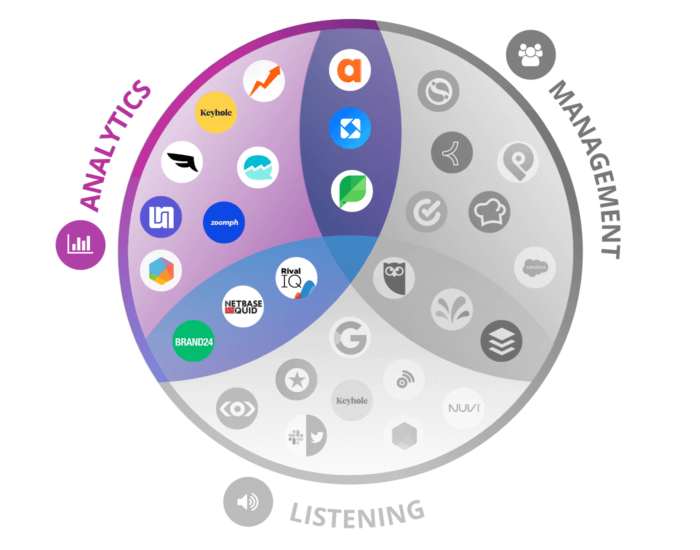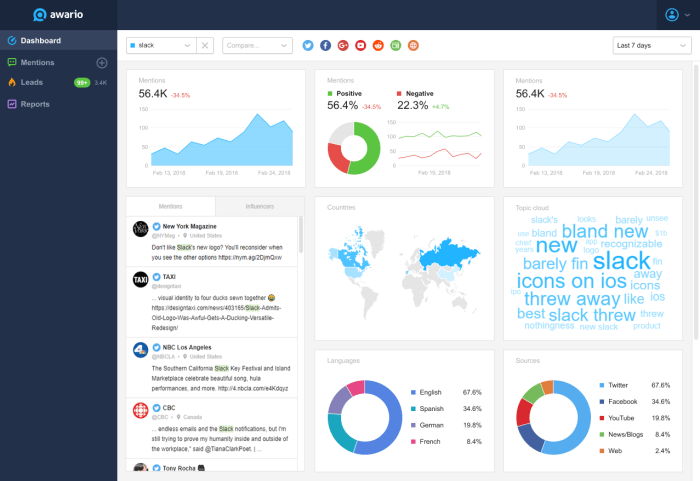Using Social Media Analytics Tools opens up a world of possibilities for businesses looking to boost their online presence and understand customer behavior on a deeper level. Dive into the realm of data-driven insights and strategic decision-making with these powerful tools at your disposal.
Introduction to Social Media Analytics Tools
Social media analytics tools are software platforms that allow businesses to track, analyze, and interpret data from their social media accounts. These tools provide valuable insights into the performance of social media campaigns, audience engagement, and overall online presence.
Using social media analytics tools is crucial for businesses to make informed decisions, improve their marketing strategies, and enhance their online visibility. By analyzing data from social media platforms, businesses can better understand their target audience, measure the effectiveness of their content, and identify trends to stay ahead of the competition.
Types of Data Analyzed Using Social Media Analytics Tools
- Social Media Engagement Metrics: These include likes, comments, shares, and retweets, which indicate how users are interacting with a business’s content.
- Audience Demographics: Social media analytics tools can provide data on the age, gender, location, and interests of a business’s followers, helping to tailor content to specific demographics.
- Content Performance: Businesses can track the performance of their posts, including reach, impressions, and click-through rates, to determine what type of content resonates with their audience.
- Competitor Analysis: Social media analytics tools allow businesses to monitor their competitors’ social media activity, benchmark their performance, and identify areas for improvement.
- Sentiment Analysis: By analyzing mentions and comments, businesses can gauge the sentiment around their brand, products, or services, and make adjustments to their strategies accordingly.
Popular Social Media Analytics Tools: Using Social Media Analytics Tools

Social media analytics tools are essential for businesses and individuals looking to track and analyze their online presence. Here are some of the most widely used tools in the market today:
Sprout Social
Sprout Social is a comprehensive social media management tool that also offers robust analytics features. Key features include customizable reports, competitor analysis, and engagement tracking. It allows users to monitor multiple social media accounts in one place.
Hootsuite
Hootsuite is another popular social media management platform with analytics capabilities. It offers real-time analytics, team collaboration tools, and social listening features. Users can schedule posts, monitor conversations, and track performance metrics.
Google Analytics
While not specifically a social media analytics tool, Google Analytics can provide valuable insights into website traffic originating from social media platforms. It allows users to track referral traffic, user behavior, and conversion rates from social channels.
Buffer
Buffer is a social media scheduling tool that also offers basic analytics features. Users can track post performance, engagement metrics, and audience demographics. It is a user-friendly tool for individuals and small businesses.
Key Features Comparison
- Sprout Social and Hootsuite offer comprehensive social media management features, while Google Analytics focuses on website traffic analysis.
- Hootsuite and Buffer are more budget-friendly options compared to Sprout Social.
- Google Analytics provides in-depth data on user behavior and conversions, which may not be available in other social media analytics tools.
- Sprout Social excels in competitor analysis and engagement tracking, making it a valuable tool for businesses looking to stay ahead in the market.
Benefits of Using Social Media Analytics Tools
Social media analytics tools offer a wide range of benefits for businesses looking to enhance their digital marketing strategies and understand customer behavior. By leveraging these tools, companies can gain valuable insights and make informed decisions to improve their overall performance in the online landscape.
Improved Marketing Strategies
- Identifying trends: Social media analytics tools can help businesses identify popular trends and topics that resonate with their target audience. By analyzing engagement metrics, companies can tailor their content to better align with what their customers are interested in.
- Competitor analysis: These tools allow businesses to monitor their competitors’ social media activities, track their performance metrics, and identify opportunities to differentiate themselves in the market.
- Optimizing campaigns: By tracking key metrics such as reach, engagement, and conversion rates, companies can optimize their marketing campaigns in real-time to ensure maximum effectiveness.
Understanding Customer Behavior
- Demographic insights: Social media analytics tools provide valuable demographic information about followers, such as age, gender, location, and interests. This data can help businesses create targeted campaigns and personalized content to better engage their audience.
- Sentiment analysis: By analyzing sentiment around their brand or products, companies can gauge customer satisfaction levels and identify areas for improvement. This insight can inform product development, customer service strategies, and overall brand messaging.
- Tracking customer journey: Social media analytics tools allow businesses to track the customer journey from awareness to conversion. By understanding how customers interact with their brand online, companies can optimize their digital touchpoints and enhance the overall customer experience.
How to Choose the Right Social Media Analytics Tool

When it comes to selecting a social media analytics tool for your business, there are several factors to consider to ensure you make the right choice. From the features offered to the pricing structure, each aspect plays a crucial role in determining the effectiveness of the tool for your specific needs.
Factors to Consider when Selecting a Social Media Analytics Tool
- Features and Capabilities: Look for tools that offer a wide range of analytics features such as monitoring, reporting, and competitor analysis.
- User-Friendly Interface: Choose a tool that is easy to navigate and provides clear insights without requiring extensive training.
- Integration with Other Platforms: Ensure that the tool can integrate with your existing social media platforms and other software systems.
- Scalability: Consider whether the tool can grow with your business and accommodate increasing data volumes and users.
- Customer Support: Check the availability and responsiveness of customer support to address any issues or questions that may arise.
Criteria for Evaluating the Effectiveness of a Social Media Analytics Tool
- Accuracy of Data: The tool should provide accurate and reliable data to base your social media strategies on.
- Actionable Insights: Look for a tool that not only presents data but also offers actionable insights to improve your social media performance.
- Customization Options: Consider whether the tool allows you to customize reports and dashboards to suit your specific needs and preferences.
- Real-Time Monitoring: A good analytics tool should offer real-time monitoring capabilities to track social media trends and respond promptly.
- ROI Measurement: The tool should help you measure the return on investment (ROI) of your social media efforts to gauge their effectiveness.
Tips on How Businesses can Determine the Best Tool for Their Specific Needs
- Define Your Goals: Start by outlining your social media goals and objectives to identify the features and functionalities you need in an analytics tool.
- Conduct Research: Explore different social media analytics tools available in the market, read reviews, and compare their features to narrow down your options.
- Request Demos: Reach out to the tool providers to request demos or trials to test the usability and functionality of the tools before making a final decision.
- Consider Budget: Evaluate the pricing plans of the tools and choose one that fits within your budget while offering the necessary features.
- Solicit Feedback: Seek recommendations from other businesses or professionals in your industry to get insights on which tools have worked best for them.